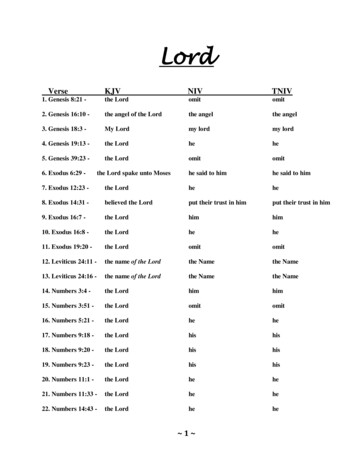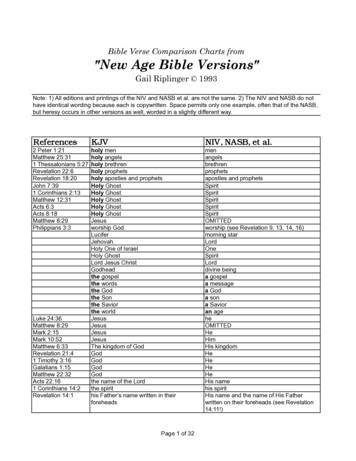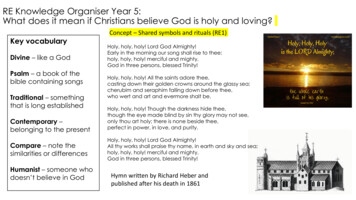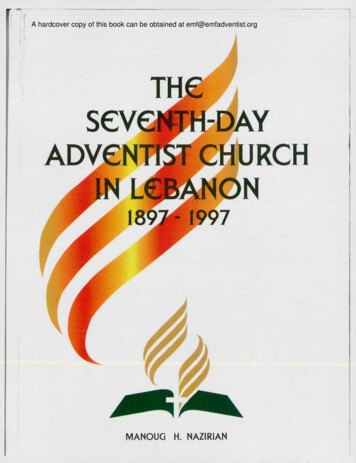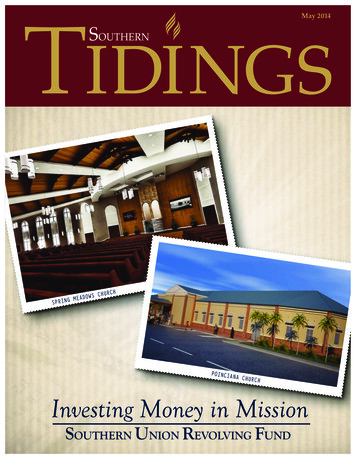
Transcription
JULY—SEPTEMBER 2020 VOL. 23, NO. 3https://stewardship.adventist.org/ordLehtoHoly t
INSIDE DYNAMIC STEWARD3 MID THE TURMOIL, HOW CAN WE16 AFIND PEACE?O FFERINGS IN THE BIBLEA theological overview ON-ANIMAL OFFERINGS IN THE18 NPROPHETSPROPORTIONAL OFFERINGS6 Spiritual Life and Church MissionOFFERINGS OUT OF COMPASSION9 A fuel for mission LLEN G. WHITE ON SYSTEMATIC12 EOFFERINGS14 OFFERINGSIn the ProphetsWHY AND HOW TO VOW REGARDING21 OFFERINGS UBSCRIBE TO THE GODFIRST24 SNEWSLETTERMeanings and Mandatory Nature169O f fer i ng s: H o ly t o t h e L o rdIt is common knowledge that the ratio of tithe to offeringsis always in favor of tithe. More recently, while observinghow the COVID-19 crisis is affecting members’ giving, I’venoticed that there is a clear trend: while there is a reductionin tithe, there is a significantly higher reduction in offerings.My inquisitive mind, and probably yours as well, has led usto consider some possible reasons for the disproportionatedrop in offerings.After mentally controlling for all other variables, I’m inclined to believe that the situation is fundamentally related tothe importance we give to offerings. Is it not true that most ofus use the adjective “holy” exclusively for the 10 percent tithe,and not for offerings? The word “holy” conveys the idea ofsacred, set apart, and mandatory. As faithful Seventh-day Adventists, we are prone to respect and honor what is declaredto be holy. I have often used this line of reasoning to convincebelievers of the importance of returning tithe. Unfortunately,offerings seem to not enjoy the same “holy” halo. What doesthe Bible say?2July - September 202020Interestingly, the Scriptures declare the two expiatoryofferings, the sin and guilt offerings, as “most holy” (Lev. 6:25;7:1). In addition, the grain and food offerings are describedas “most holy part” and “too sacred” (Lev. 2:3; 22:10). Bothofferings, grain and food, were not meant for atonement, butto worship God and acknowledge His provision for the needsand life of His children. As such, these offerings should informour current practice. Hence, it is very appropriate to bringback the “holiness” to our teaching of offerings.Our aim for this issue of the Dynamic Steward is torevisit the scriptural foundation for our practice and teachingregarding offerings. We are thankful to the group of Adventistscholars and stewardship educators who delved into this subject from their various areas of expertise. Their submissionsbring a refreshing perspective to this important discipline ofthe Christian’s journey.—Aniel Barbe, Editorh t t p s : / / s t e w a r d s h i p. a d v e n t i s t . o r g /
SPECI AL I S S UE O N O FFER I NGSOFFERINGS IN THE BIBLEA T H E O L O G I C A L OV E RV IEWÁNGEL MANUEL RODRÍGUEZThe people of God bring offerings to the Lordbecause it is His loving will for them. Like tithe,offerings are to be brought to God as an act ofrespectful obedience. While tithe is primarily a moralduty (tithe belongs to God), offerings are primarily anexpression of gratitude to God (Mal. 3:10). The Bible contains a significant amount of information about offeringsthat reveals a number of important and common themes.We will discuss and summarize only some of the mostimportant ones.Theological BasisTheologically, the practice of bringing offerings to theLord is related to several interrelated ideas that expressaspects of God’s character as He relates with humans. Thefirst is soteriology: that is, God’s constant and loving disposition to save humans from the power of sin; He is the Savior.Salvation is a revelation of God’s grace and reaches us as anundeserved gift to be accepted by faith in Christ (Rom. 3:21,22). God’s self-revelation disclosed the unfathomable fact thatHe is the greatest giver in the universe in that He provides foreverything needed to preserve life on the planet, and He gaveHis only Son for the salvation of the world (John 3:16). Thisglorious gift was prefigured in the Old Testament sacrificialsystem. Throughout the ancient Near East, offerings propitiated divine wrath and made the offerer acceptable to thegods. This was salvation by works.In the Bible, the wrath of God, provoked by human sin, isalso resolved through a sacrifice/an offering. The differenceis that the biblical God knows that humans do not possessanything valuable enough to resolve the problem caused byhuman sinfulness and rebellion. Consequently, God providedthe sacrifice capable of reconciling humans to Him, represented in the Old Testament by the expiatory sacrifices/offerings(Lev. 1-4). God gave to the Israelites the blood of sacrificialanimals to make atonement for them on the altar (Lev. 17:11).Those sacrifices were in themselves ineffective in bringing afinal resolution to the problem of human sin. The divine designpointed to and intended to show that the most importantoffering was going to be given by God to cleanse us fromsin (Isa. 52:13-53:12; Heb. 10:14; Rom. 3:25). The Lord was toprovide the Lamb (Gen. 22:8, 13), and the New Testament reveals that He indeed provided the Lamb (John 1:29). We nowhear the voice of Jesus speaking to us: “For God so loved theworld that He gave His only begotten son” (John 3:16).* Thelesson is clear; we should never bring an offering to the LordDynamic Stewardseeking to obtain His favor or love, because these are oursthrough an offering that we could not provide, that He in factbrought forth for us. This divine offering of disinterested lovedisplays the most important theological foundation for ourgiving: we give because God gave first, and, consequently, inour giving we reflect His character. Since God provided thatmost costly offering, we are now enabled and expected byGod’s grace to bring to Him an acceptable offering (Mal. 3:10).The second element in the theological foundation for trueofferings is God’s faithfulness to His promises and the reliability of His word. His character is such that what He says iswhat He does (cf. Titus 1:2). He promised to bless His people,and He did it. When the Israelites brought the firstfruits of theland to the Lord as an offering, they affirmed God’s trustworthiness: “I declare this day to the Lord my God that I haveentered the land which the Lord swore to our fathers togive us” (Deut. 26:3)—and expressed their gratitude. “I havebrought the first of the produce of the ground which You, OLord have given me” (verse 10). God also promised to dwellwith humans, providing them with an identity and supplyingtheir needs, and He fulfilled His promises (cf. John 1:14; Matt.5:45; Acts 17:25). We can only give Him from what He “hasgiven” us in fulfillment of His promises, therefore the blessingprecedes bringing an offering (Deut. 16:17; 1 Chr. 29:14).July - September 20203
The third element in the theological foundation for offerings isGod’s lordship. The God who saved us freely and who is faithful to His promises, is also our Lord and deserves homage. Heis our King, and we cannot come before Him empty-handed(Deut. 16:16). Malachi asked the priests, who were offeringto the Lord defective offerings, “Why not offer it to your governor? Would he be pleased with you?” (Mal. 1:8). God is theultimate Lord, and we show Him respect and honor throughour offerings. The three kings identified Jesus as the King ofkings and gave Him gifts of homage (Matt. 2:1-11; cf. Isa. 18:7).The psalmist announced, “Kings will bring gifts to You” (Ps.68:29); they will recognize His lordship.Motivation for Giving OfferingThe three theological concepts listed above also provide themost important motivation for human giving, namely, gratitudeon account of God’s grace and loving rule over us. First, there isGod’s grace. Humans are called and challenged to give becauseGod’s grace revealed itself in the free gift of salvation throughChrist (Rom. 5:15). Christians are motivated to give becauseGod, who keeps His promises, is constantly blessing and protecting His people (cf. 2 Cor. 8:1, 2). Divine grace can soften thehuman heart and make it benevolent (cf. 2 Cor. 8:9).Second, the recognition of the lordship of God shouldmotivate us in our giving. The fact that there is one Lord whorules the universe and owns everything in it lies at the root ofbenevolence (Ps. 24:1; 50:8-14). This most wonderful God allows us to assist Him as stewards of His creation (Gen. 1:28).This divine work assignment reveals the great value God’sgrace has placed on us and provides a valid purpose for ourexistence. God wills us to be His stewards, and His will for usis always good in that is seeks to enrich and transform us.A third motivation for giving is found in the recognitionthat God is working through His church for the salvation ofhumanity (Acts 1:8). He gave us a mission, and He has alsogiven us the means to achieve that mission—it is in our pocketsor purses or credit cards. Paul said to the Corinthians that God“will supply and multiply your seed for sowing and increase. . .You will be enriched in everything for all liberality, whichthrough us is producing thanksgiving to God” (2 Cor. 9:10, 11).Offerings and the fulfillment of the mission of the church areinseparable. Nothing should be more important for believersthan the proclamation of the gospel of grace; they should countit a privilege to be instruments of God in that task.In summary, we could say that what motivates Christians togive offerings is their love for God, a selfless love whose focusof attention is God and fellow human beings. Giving should notbe an attempt to obtain or gain God’s sympathy, love, or recognition. It is only through the sacrificial offering of Christ that weare accepted by God. Our giving is preceded by God’s savinggrace and should always be a response of gratitude.An Acceptable OfferingOur last comment leads us logically to a definition of anacceptable offering. First, an acceptable offering should be aself-offering; an expression of our willingness to give ourselves4July - September 2020to God. It is a deeply religious experience because it is a tokenof a life wholly surrendered to the Lord. This is illustrated inthe burnt offering (Lev. 1), which was totally burned on thealtar. It stood as a symbol of a life totally dedicated to the Lord.In the New Testament, Jesus illustrated this concept with theexperience of the widow’s offering (Luke 21:3, 4). An offeringthat comes from a heart filled with love is an expression of thesurrendering of the whole person to Christ. In such cases, Godhas become first in our life.Second, an acceptable offering is an expression of faith inGod’s providential care for us. This is also illustrated by thewidow who trusted that the Lord would provide for her, andso she brought her offering to Him. God asked the Israelitesto trust Him and to bring their tithes and offerings (Mal. 3:810). Paul praised the Philippians for trusting in the Lord whengiving their offerings: “For I testify that according to their ability,and beyond their ability, they gave of their own accord” (2Cor. 8:3). They cautiously gave beyond what would appear tobe financially feasible for them. Thus, Paul assured them that“my God will supply all your needs according to His richesin glory in Christ Jesus” (Phil. 4:19). Faith in God helps us toovercome selfishness.Third, and based on our previous discussions, we couldsuggest that an acceptable offering is the embodiment ofthe worshipper’s gratitude, thanksgiving, joy, and love. In theBible, offerings are practically always expressions of gratitude,joy, and love. The burnt and peace offerings were brought toexpress gratitude and joy to the Lord for His many blessings. The Temple was a place of joy as the people came withtheir offerings to worship God (Deut. 27:7; Ps. 95:2). Theseare all responses to the experience of God’s redemptive andprovidential love.There are probably different ways of expressing gratitudeand love. Most often we use words, but they are not alwaysenough. On the day of your wedding anniversary, words are notenough.You are expected to bring a special gift. The best wayto express love and gratitude is not through words but throughactions. A gift is the embodiment of an emotion or a positiveattitude. Such things are deep inside us, and we exteriorizethem by providing for them a visible body in the form of a gift.An offering is the embodiment, or concretization, of thanksgivings for a blessing we received from the Lord. The Lord receivesthat act of love and gratitude, and He uses it according to Hisown purpose. When my offering is received in some other partof the world, the recipients are in reality receiving an expressionof my love and gratitude to God in a tangible way. An offeringis indeed the concrete shape that our inner feelings and attitudes toward God’s love take in our act of worship.Fourth, an acceptable offering is a freewill offering andnot one brought to the Lord under compulsion or reluctantly.The Lord does not force us to bring Him offerings, but Heexpects us to give offerings. God told Moses, “Tell the sonsof Israel to raise a contribution [terûmāh, a gift dedicated toGod] for Me; from every man whose heart moves [nādab,“urge, give voluntarily”] him you shall raise My contribution”(Ex. 25:2; see Ezra 1:6). Paul says about the Philippians thath t t p s : / / s t e w a r d s h i p. a d v e n t i s t . o r g /
they “gave of their own accord” (2 Cor. 8:3), meaning on theirown; that is to say, willingly and voluntarily. Giving comes fromthe heart because it is there that the decision is made: “Eachone must do just as he has purposed in his heart” (2 Cor.9:7). Paul then explains what he means: “Not grudgingly [lupē,“hurting, painfully”] or under compulsion [under the controlor influence of someone or something other than one’s ownvolition] for God loves a cheerful giver.” Instead, Paul says, givejoyfully!Fifth, an acceptable offering is one that comes from aheart at peace with God and others. The act of worshippresupposes that religion and ethics are not to be compartmentalized or separated from each other. Dealing properlywith others is as much a religious duty as bringing an offeringto God. Here Jesus was very clear: “If you are presenting youroffering at the altar, and there remember that your brotherhas something against you, leave your offering there beforethe altar and go; first be reconciled to your brother, and thencome and present your offering” (Matt. 5:23, 24). Of course,one could give seeking self-recognition and not because thereis peace in the heart, but Jesus condemned such an attitude(Matt. 6:1-4).Sixth, an acceptable offering, although spontaneous, is atthe same time systematic. We are expected to plan our givingbased on our income. This means that giving should not becontrolled by your emotions but, rather, based on a decisionyou made to give to the Lord a certain amount, a percentage,on a regular basis (Deut. 16:17). Paul also says that you shouldgive according to your means (2 Cor. 8:11). We should recallthat in the Old Testament, offerings were graded on the basisof the economic condition of the Israelite. A wealthy personwas expected to bring a young bull, but others, depending oftheir financial condition, could bring a sheep, a goat, or evena bird (Lev. 1:3, 10, 14). God does not require from us morethan we can do. This implies that we should not press churchmembers to give beyond their capacity to give.Collection and Management of OfferingsOur previous point raises the question of the logisticsin the biblical system of offerings. The Bible provides certainguidelines in the collection and management of offerings. Theoffering is to be set apart at home, based on the blessingsreceived from the Lord (1 Cor. 16:2; “each one of you,” thatis to say, privately at home). This is an act of dedication, orconsecration, of the offering to the Lord. God and the churchappointed specific instruments to receive the offerings. Thesewere recognized by the community of believers as beingworthy of receiving and administering them (2 Cor. 8:9, 17-23;9:3). In Israel, the Levites collected the offerings and madesure that they reached God’s intended purpose. Offeringsshould not be given to anyone who is simply claiming to bea servant of God but who operates outside the organizedchurch of Christ; offerings belong to the Lord (Mal. 3:10). Theplace to bring them was the Temple or the church wherepeople gathered for collective worship to the Lord (Mal.3:10). There is some evidence indicating that proper recordsDynamic Stewardwere kept and that the offerings were used for the assignedpurposes (see 1 Cor. 16:3; Phil. 4:18).Specific Purposes for OfferingsThe Bible mentions several specific purposes for bringingan offering, such as providing for the needs of the sanctuaryor the church. Thus, we find offerings for the building andreparation of the sanctuary temple (Exod. 25:2; Ezra 8:25),offerings for the poor (Rom. 15:25-28; 1 Cor. 16:1-4; 2 Cor. 8,9), and offerings for the support of the sanctuary services andthe gospel ministry (Matt. 10:10). Offerings serve to strengthen the unity of the church (Rom. 15:27). Through their offerings believers showed themselves to be one in spirit, message,and purpose. By supporting a local project, the world churchfinds an occasion to express the unity that keeps them together. Offerings create financial equality within the church.The theologicalChurches that had much,with those who hadfoundation for true sharedlittle (2 Cor. 8:13-15). Finally,one of the most importantofferings is God’spurposes of offerings was tomotivate people to praisefaithfulness to HisGod. Through them the spiritof gratitude is nurtured withinpromises and thethe community of believers,and God is praised for thereliability of Hisbenevolence of His instruments (2 Cor. 9:12).word.ConclusionBy way of conclusion we should ask about God’s intentions for asking us to bring offerings to Him; He certainly doesnot personally need them. We have already identified someof them. First, the Bible suggests that God used the system ofofferings to teach His people how to express their love andgratitude to Him. In this way, selfishness would be defeated intheir lives. Another reason God required offerings was for Hispeople to express loyalty to Him by rejecting idolatry. Bringingtheir offerings to Him reminded them that Yahweh was thetrue Owner of everything and that it was He who blessedthem. The land did not belong to Baal, and it was not Baalwho made it fruitful; it was the Lord Yahweh. Finally, God required offerings from His people in order to strengthen theirrelationship with Him. Each offering provided for the peopleof God an opportunity to re-consecrate themselves to Him.The relationship established with Him through His gloriousact of redemption was renewed, and the bond of love wasstrengthened in an act of personal devotion.Ángel Manuel Rodríguez (ThD) retired from serving theAdventist Church as director of the Biblical Research Instituteof the General Conference in 2011 and continues to workpart-time for the Institute.* Scripture quotations are from the New American Standard Bible, copyright 1960, 1962, 1963, 1968, 1971, 1972, 1973, 1975, 1977, 1995 by TheLockman Foundation. Used by permission.July - September 20205
SPECI AL I S S UE O N O FFER I NGSPROPORTIONAL OFFERINGSS pi r i t u al Li fe a nd C hurch M i s s i onDEMÓSTENES NEVES DA SILVAIntroductionFrom the beginning of this world’s history, Cain’s andAbel’s offerings teach us that giving is vital to worship.They also show that the giver’s spiritual state is essential for the offering to be acceptable (Gen. 4:1-7). The offeringwas an indispensable part of public worship during Israel’sgreat feasts, where one was not to come before God “emptyhanded” (Deut. 16:16).1 In those instances, the offering wouldbe an acknowledgment of the blessings and not a means toacquire them; an expression of gratitude, not salvationthrough works.Approximately two dozen different wordsare used in the Old Testament to describethe various types of offerings and theirmeanings.This shows that giving, sostrongly present inthe people’s6July - September 2020vocabulary, was part of the way in which they perceived andlived their lives. Therefore, all offerings pointed to a generalview that God is the owner of all things (Ps. 24:1).In this article, we will limit our discussion to three aspectsrelating to the proportionality of offerings. The first dealswith mandatory offerings; the second with freewill offerings;and the third addresses the qualitative aspect of giving. Aswe will see, these three aspects point to proportionality as aresponse to divine blessings, an indicator of the giver’s spirituallife and commitment to the church’s mission.Mandatory OfferingsAs a part of worship, mandatory offerings were previously determined andestablished by biblical instruction.However, as the following examples show, in spite of havingbeen established in termsof the produce, animals, oramounts to be given, theseofferings observed sometype of proportion relative to the financial statusof the giver. An exampleof these are sin offerings(Lev. 4-5), which weregiven in gratitude for healing (Lev. 12:1-33) and thosegiven for the birth of a childand purification after birth (Lev.14:10, 11, 21-31).Thus, depending on the seriousness of the offense and the person’sstatus (a prince, a rich person, or a poorperson), the sin offerings and other mandatory offerings varied from bulls and calves to rams, goats, lambs, doves,and pigeons. This way, there was always a correlation betweeneach person’s ability to contribute and their offering. The offering or its proportional value had already been determined,and the worshipper had only to obey.The fixed and mandatory proportion is also found indifferent circumstances during Israel’s history, showing God sway of dealing with His people. Here are some examples.In the redemption of slaves and properties. In this case, aproportion was used according to time. The value of theredemption paid should be proportional to the proximity ofthe Jubilee, when a general amnesty of the debt would occur(Lev. 25:52). The farther away the Jubilee, the more valuableh t t p s : / / s t e w a r d s h i p. a d v e n t i s t . o r g /
was the slave or the property.In the division of the inheritance among the tribes. Thisprinciple was applied once again because the tribes of Israelreceived land in proportion to their population (Num. 26:54).In the distribution of the cities to the Levites. The proportionconcept was also used in this case. Each tribe made its donation of cities to the Levites in proportion to the number itpossessed (Num. 35:8).In the tithe brought by the people for the priestly service (Lev.27:30; Num. 18:21, 24; Mal. 3:8-10).All that was brought to the Lord was an offering. Therefore, in spite of having a specific purpose to support thepriesthood, the tithe should also be given as an “offering”(Num. 18:24).In the above text, the word that identifies the giving oftithe as an offering (terumah) is the same used in Malachi (3:8)to distinguish between tithes (maaser) and offerings (terumah).Thus, the tithe is a fixed proportional offering, but not all offerings are tithe.The tithe was not established by the Levites, but it wasa mandatory fixed offering to support the ministry sinceancient times. It is first mentioned in the Bible approximately500 years before the Levitical priesthood, when Abrahamgave his tithe to Melchizedek (Gen. 14:18-20).Melchizedek’s ministry has no beginning or end. Therefore, his right to tithe also has no beginning or end. Thisright belongs to Jesus, who is alive and whom Melchizedekrepresents (Heb. 7:1-8).Consequently, all the other mandatory and fixed offeringselapsed with the ancient context and the reliance on the typical ceremonial system, which was fulfilled in Jesus. However,the tithe is the only one that remains. Additionally, there is notext abolishing it in either the Old Testament or the New Testament; and its validity, different from other mandatory fixedofferings, is not dependent on the Levitical system.Proportionality appears in various situations in the relationship between God and His people, both in the Old Testament and the New Testament. According to this principle,each one will be accepted according to what he has and notaccording to what he does not have (2 Cor. 8:12).However, the purpose of all these mandatory offeringswas not to acquire divine blessings, but to acknowledge Godas the Owner and Creator, as well as to have communionwith Him by the redemptive significance of each offering.Let’s focus now on freewill offerings.Freewill OfferingsUnder the quantitative aspect, freewill offerings are giventhis name because they should be voluntary. As we saw, Goddetermines the percentage or amount of mandatory offerings,but the worshipper decides on the value of the freewill orvoluntary offerings. The worshipper is faced with the decisionof how much to give, which is not the case with fixed mandatory offerings. Therefore, the Bible describes these givers asanyone who “gives it willingly with his heart” in terms of howmuch to give (Exod. 25:2).Dynamic StewardIn addition to voluntary offerings, in freewill offerings “every man shall give as he is able” and “according to the blessingof the Lord your God which He has given you” (Deut. 16:17).This means that the voluntary offering should be (1) proportional “to the blessing” and (2) given “willingly with his heart”(Exod. 25:2), because the calculation is at the discretion ofthe giver. Mandatory fixed offerings were established on thebasis of generosity, as can be seen in the animals required forsacrifice, in other offerings, and in tithe. This points to generosity being exercised also in the proportion of freewill offerings,according to these Bible examples (Exod. 25:1, 2; Ezek. 2:68,69; Neh. 7:70-72; 10:32, 33; 1 Chron. 29:1-18).Furthermore, in his offerings campaign among thechurches, the apostle asks that “each one of you lay somethingaside, storing up as he may prosper, that there be no collections when I come” (1 Cor. 16:2). Here, planning is added toproportionality, as David did when he gave offerings for thetemple (1 Chron. 29:2).According to the above, the proportion of all incomedetermines the frequency of the offerings, since the offering occurs regularly with each gift received, “according to theblessing of the Lord” (Deut. 16:17). Thus, the frequency has apositive impact on the ChrisProportionality and tian experience, as it denotesa systematic personal commitment to worship and thequality cannot bechurch’s mission.Therefore, the offeringsseparated, just likeremain valid today, followinglove and generosity. a principle of proportionality.Two types of proportionalofferings also remain: fixed mandatory offerings (tithe) andfreewill offerings (voluntary) given “willingly with his heart.”The giver’s spiritual experience and his/her commitment tothe Lord’s work are emphasized in both.Quality of the OfferingThe harvest offerings should be “the first of your ripeproduce and your juices” (Exod. 22:29), and “whoever offersa sacrifice of a peace offering to the Lord, to fulfill his vow,or a freewill offering from the cattle or the sheep, it mustbe perfect to be accepted; there shall be no defect in them”(Lev. 22:21).According to the above, the offerings were predominantly farming produce and animals, and the quality of theoffering was the quality of the animal or produce offered.However, the Bible teaches that the spirit with which theworshipper gives will determine if the offering will be “thebest” and “without defect” or if it will be the result of a pettyheart that brings to the altar that which is disposable or lessvaluable (Mal. 1).Three Bible examples expand on the meaning of the excellence of the offering, which goes beyond the item offeredand deals with the condition of the giver’s heart.The first example is of the poor widow (Mark 12:41-44).Jesus taught that, more than what is given, the quality of theJuly - September 20207
Credit: Getty Imagesoffering is expressed by how the worshipper gives. The valueof the offering is the proportion that requires sacrifice. Thetext is clear: the widow gave all that she had, and even thoughit was small in terms of quantity, this small amount was plenty,considering the proportion in relation to her possessions.Though they gave much, the other givers gave what wasleft over, and there was no generosity or sacrifice in theamount of their offerings. Therefore, it is not enough forthe offering to be proportional, it also has to be generous.That way, the widow’s offering was meaningful to Jesus, whopraised her and set her as an example for all those who serveGod.The second example is found in David’s speech when hecalled for offerings to be brought for building the temple (1Chron. 29:1-18). He said he gave “with all my might” (verse 2),moved by “my affection of the house of my God” (verse 3),and together with the people “rejoiced greatly” (verses 9, 17),acknowledging that “all that is in heaven and in earth is Yours”(verse 11), and that giving is to return because “all thingscome from You, and of Your own we have given You” (verse14), on the conviction that He has “pleasure in uprightness”(verse 17). Once again, the emphasis is on the virtues of theworshipper’s heart.Finally, the third example comprises the instructions of theapostle Paul. In addition to proportionality “as he may prosper” (1 Cor. 16:2), he emphasizes that the offering shall bepreceded by “your willingness” (2 Cor. 9:2), and “prepare yourgenerous gift beforehand,” “as a matter of generosity” (verse5), “as he purposes in his heart” (verse 7), by a “cheerful giver”whom God loves (verse 7).Therefore, offerings given lovingly and cheerfully are pleasing to God (verse 7) because they are never meager.8July - September 2020It is important to remember once again that the proportionality and generosity of mandatory and freewill
to be holy. I have often used this line of reasoning to convince believers of the importance of returning tithe. Unfortunately, offerings seem to not enjoy the same "holy" halo. What does the Bible say? Interestingly, the Scriptures declare the two expiatory offerings, the sin and guilt offerings, as "most holy" (Lev. 6:25; 7:1).





